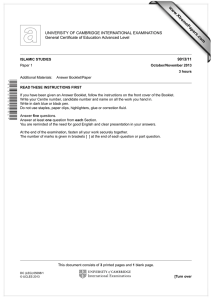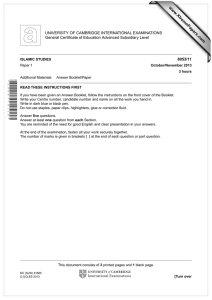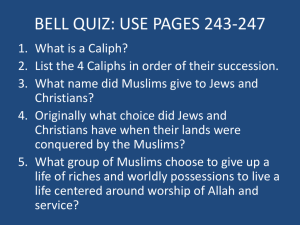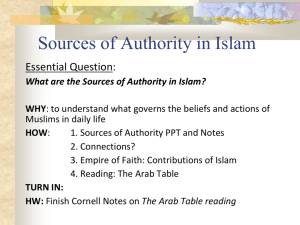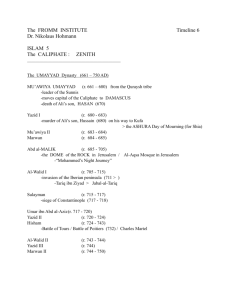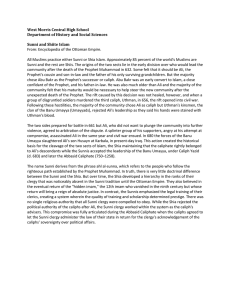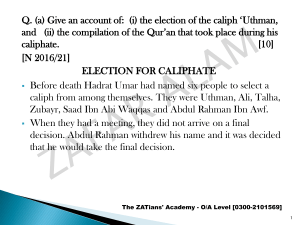T The 3rd Khalifah al-Rashid Dr. Zakariyau Oseni
advertisement
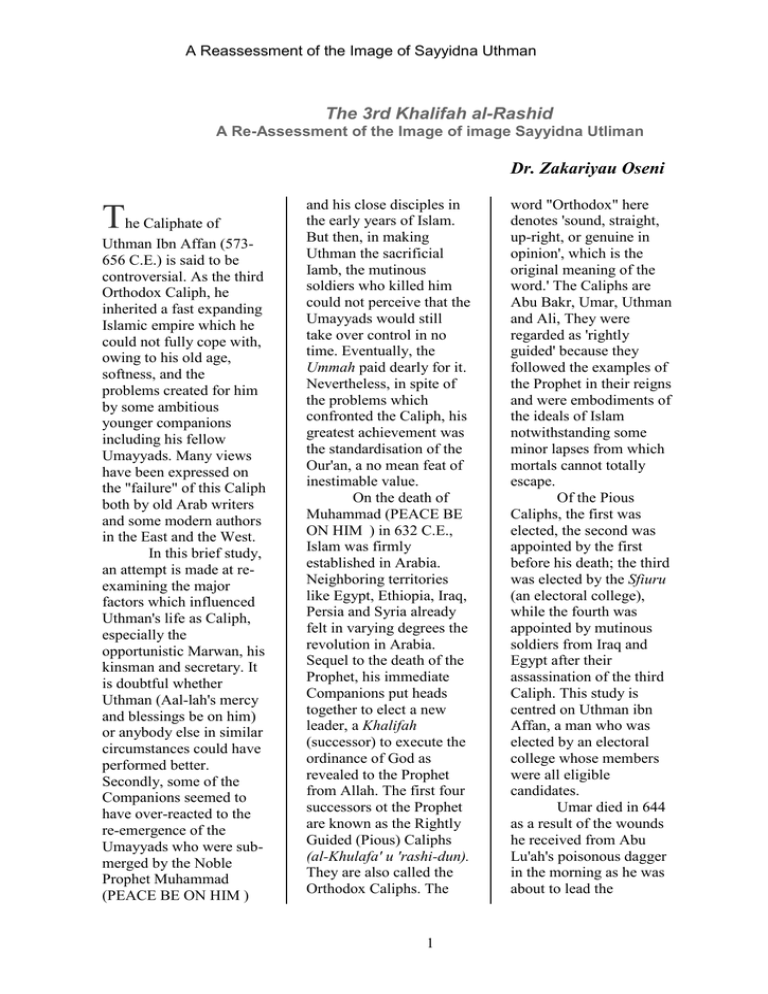
A Reassessment of the Image of Sayyidna Uthman The 3rd Khalifah al-Rashid A Re-Assessment of the Image of image Sayyidna Utliman Dr. Zakariyau Oseni The Caliphate of Uthman Ibn Affan (573656 C.E.) is said to be controversial. As the third Orthodox Caliph, he inherited a fast expanding Islamic empire which he could not fully cope with, owing to his old age, softness, and the problems created for him by some ambitious younger companions including his fellow Umayyads. Many views have been expressed on the "failure" of this Caliph both by old Arab writers and some modern authors in the East and the West. In this brief study, an attempt is made at reexamining the major factors which influenced Uthman's life as Caliph, especially the opportunistic Marwan, his kinsman and secretary. It is doubtful whether Uthman (Aal-lah's mercy and blessings be on him) or anybody else in similar circumstances could have performed better. Secondly, some of the Companions seemed to have over-reacted to the re-emergence of the Umayyads who were submerged by the Noble Prophet Muhammad (PEACE BE ON HIM ) and his close disciples in the early years of Islam. But then, in making Uthman the sacrificial Iamb, the mutinous soldiers who killed him could not perceive that the Umayyads would still take over control in no time. Eventually, the Ummah paid dearly for it. Nevertheless, in spite of the problems which confronted the Caliph, his greatest achievement was the standardisation of the Our'an, a no mean feat of inestimable value. On the death of Muhammad (PEACE BE ON HIM ) in 632 C.E., Islam was firmly established in Arabia. Neighboring territories like Egypt, Ethiopia, Iraq, Persia and Syria already felt in varying degrees the revolution in Arabia. Sequel to the death of the Prophet, his immediate Companions put heads together to elect a new leader, a Khalifah (successor) to execute the ordinance of God as revealed to the Prophet from Allah. The first four successors ot the Prophet are known as the Rightly Guided (Pious) Caliphs (al-Khulafa' u 'rashi-dun). They are also called the Orthodox Caliphs. The 1 word "Orthodox" here denotes 'sound, straight, up-right, or genuine in opinion', which is the original meaning of the word.' The Caliphs are Abu Bakr, Umar, Uthman and Ali, They were regarded as 'rightly guided' because they followed the examples of the Prophet in their reigns and were embodiments of the ideals of Islam notwithstanding some minor lapses from which mortals cannot totally escape. Of the Pious Caliphs, the first was elected, the second was appointed by the first before his death; the third was elected by the Sfiuru (an electoral college), while the fourth was appointed by mutinous soldiers from Iraq and Egypt after their assassination of the third Caliph. This study is centred on Uthman ibn Affan, a man who was elected by an electoral college whose members were all eligible candidates. Umar died in 644 as a result of the wounds he received from Abu Lu'ah's poisonous dagger in the morning as he was about to lead the A Reassessment of the Image of Sayyidna Uthman obligatory Dawn prayers (Salat al-Subh). The assassin was a Persian Christian slave in Madinah.2 Before his death a few hours later, the Caliph appointed an electoral college (alShura) made up of six prominent Companions to elect a new Caliph from among themselves. The six men were Uthman bin Attan, Ali bin Abi TUib, al-Zubayr bin al-Awwam, Abd al-Rahman bin Awf, Talha bin Ubaydillah, and Sad bin Waqqas.3 The Shura met and finally elected Uthman, the oldest of them as the new Caliph, his keenest rival being Ali. Abu Bakr was engaged in a war with renegades (al-Murtaddun) most of his reign (632-4). The war metamorphosed into the war of conquests as a result of many clashes with territories close to Arabia. During the reigns of Abu Bakr and Umar., Syria, Iraq, parts of Persia and Egypt were conquered by the Muslims. The conquest showed that Arabian power, hitherto bottled up in the Peninsula, had burst and one country after another fell before the gallant men who were fired by zeal and power of faith.4 In spite of the sudden wealth of the new empire, Umar maintained a low profile throughout his reign. On this, there are countless anecdotes/ In any human society, one would hardly expect that type of self-restraint and sacrifice to prevail for ever. War lords became exposed to the glittering luxuries of life in the conquered territories. Rural ruggedness and Arabian fortitude could not he maintained strictly for too long. So the stage was set for problems. Ulhman's rise to power and the problems which confronted him should be seen in this light. Human beings are mortals and they sometimes fall short of expectation no matter their level of attainment. The only exception is that special group called Anbiya' (Prophets) in the Islamic context. The observations in this paper are an attempt to re-interpret the major facts about the third Caliph's life. Perhaps, this will help scholars of Islamic history to see in better light the man and Caliph called Uthman who has not been properly appreciated by most historians — both old and modern. Uthman ibn Affan ibn Abi'l-As ibn Umjjrtayyah was born about the year 573 C.H. in Makkah.'' His family produced the leading aristocrats who controlled the Makkah economy and politics at the time the Prophet Muhammad grew 2 into manhood. Foreseeing the political challenge which the Prophet posed to them, the Umayyad family under the leadership of Abi Sufyan ibn Harb opposed the Prophet until the consequent of Makkah in January 630 C. E. Uthman was the most prominent Umayyad win) embraced Islam during its formative years in Makkah. He-was a devoted follower of the Prophet. Rich and generous, he played a vital role together with Abu Bakr in funding many early projects in the Muslim Community. He married Ruqayyah, the daughter of the Prophet and both husband and wife lived happily and participated in the first migration to Ethiopia in 615 which was occasioned by the persecution of the Muslims by the powerful idolators of Makkah.7 When Ruqayyah died in 624, the Prophet gave Uthman Ruqayyah's younger sister, named Umm Kulthum in marriage. He was therefore surnamed Dhu 'n-Nurayn (one who possesses two lights).8 When Uthman became Caliph in 644, he was already over seventy years old, far older than the age at which the Prophet and the first two Calips passed away. The Arab conquest in North Africa continued A Reassessment of the Image of Sayyidna Uthman unabated. In the East, Muslim forces were gradually conquering the lands of Persia. Meanwhile Muawiyah, the governor of Syria, had built a navy with the collaboration of experienced seafaring Syrians lo counter the menace posed by the By'zantine sea-power whose base in Cyprus was too close to the Syrian coast for comfort. While the empire continued to expand by leaps and bounds, some internal problems developed. The Caliph's characteristic softness which had been aggravated by old age, made his kinsmen, the Urnayyads, want to lake advantage of the situation. His secretary was his wily and unscrupulous cousin, Marwan ibn al-Hakam. Muawiyah had been the governor of Syria for more than one decade, Abdullah ibn Abi Sarh, the Caliph's notorious foster-brother1* was made governor ot Egypt in derogation of Amr ibn alAs who conquered the territory and who was then made to "hold the cow by its two horns while another milks it.10 In Iraq there were complaints against the governor of kufah, Walid ibn Uqbah, who was allegedly found drunk in the mosque.11 As a result of the undisguised prominence of Banu Umayyah in Uthman's administration, there was discontent all over the provinces. Allegations of nepotism, tribalism, misappropriation of public funds and intolerable ir-religiosity were levelled against the Culiph and his Umayyad kinsmen.12 It was evident that the Umayyads had reasserted their leadership of the Quraysh (and then, of all Arabs and the conquered peoples) so soon after the consolidation of Islam, a faith which their clan opposed vehemently for a long time. Right from the beginning of Muhammad's Prophetic mission, people knew that Uthman was a rich man. When he was saddled with the Caliphate, he did not take any allowance for his duties.13 As a result of extensive conquests, wealth poured into Madinah, the Capital of the Islamic state at the time. The Caliph spent it lavishly in building or renovating mosques, roads, guest houses, bridges and many other public utilities in the empire. The prophet's modest mosque in Madinah was expanded.14 The greatest achievement of Uthman in the realm of Islam was the redaction and duplication of the Qur'an which he carried out. An official named Hudayfah 3 ibn Yaman (d. 36 A.H.) toured the conquered provinces and discovered that there were some dialectal differences in the manner the Muslims in those area were reading the Qu'ran. He also discovered that many non-Arab Muslims made serious mistakes in reading the Qur'an. These two problems gave him much anxiety and when he returned to Madinah he gave a report of his findings to the Caliph. Consequently, the Caliph Uthman set up a board under the chairmanship of Zayd ibn Thabit to redact and make many copies of the Qur'an available to the people. That was about the year 650.i5 The one previously compiled during the reign of Abu Bakr which was now under the custody of Hafsah (Umar's daughter and the Prophet's widow) was used and further verified with what people learnt by heart, in the end, a number of copies of the standard Qur'an (known from then on as the Uthman Edition) were sent to places like Makkah, Fustat (Old Cairo), Kufah, Basrah, Damascus, etc.16 All the defective private copies which had dialectal colorations different from the original Quraysh dialect in which the Qur'an was revealed, were burnt or destroyed A Reassessment of the Image of Sayyidna Uthman with hot water.17 it should be remarked at this juncture that Arabic writing was at that time still primitive and the diacritical points we have today were supplied later by al-Hajjaj ibn Yusuf through scholars like Yahya bin Yamur and Nasr bin Asim.18 By Uthmaifs leal which safeguarded the uniformity, pur ity and oneness of the Qur'anic text as a scripture for all times, Muslims of all ages and climes will always remember the Caliph. This is in spite of the gloomy pictures which many partisan and prejudiced writers painted about him. A number of historical sources quote with relish that Uthman, ruled well in the first six years and then misruled in the remaining six years. To me, this is too simplistic and neat to be wholly true as other factors indicate. One important allegation against Uthman was that he did not consult the leading Companions before taking important decisions.20 Rather, he relied almost solely on Marwan and other kinsmen of his. Perhaps, age was telling on the Calliph, and instead of bringing virile younger Companions such as AH, Abdullah ibn Umar, Tulhah and alZubayr into the administration, he allowed Marwan certain powers to run the administration.21 Abu Dharr alGhifuri, a very pious Companion was exiled to the oasis of Rabadah when the former began to criticise Muawiyah's policies in Syria vigorously. Muawiyah sent Abu Dharr to Madina and complained that the pious man was formenting trouble in Syria. The Caliph's response was to banish Abu Dharr. However, rightly or wrongly, the act angered many Muslim leaders.22 Similarly, the propaganda of one Abdullah ibn Saba', a Jew turned Muslim from Yemen helped to fuel discontent against Uthman, his immodest secretary, Marwan, and some other dignitaries. Abdullan was a staunch loyalist of Ali ibn Abi Talib. He addressed people in Kufa, Basrah and Syria. He then went to Egypt, a more congenial atmosphere to sow the seed of discord.23 He stressed the view that the ideal man to succeed the Prophet was Ali and branded the first three Caliphs as usurpers. As two of the first three were already dead, Uthman became the sole target. Ali reprimanded Ibn Saba on several occasions, especially 4 when he went further to put Messianic garbs on Ali and claimed that he (Ali) would come after his death and rule the world justly. Uthman seemed to have overlooked the propaganda of Ibn Saba and did not check him. Eventually there was a serious reactionAbout five hundred mutinous soldiers came from Egypt and Iraq to Madinah with a view to lodging complaints against their governors. The Caliph promised to look into their grievances and advised them to go buck to their respective stations. After a few days, they came back to Madinah with a letter they claimed to have intercepted from a courier purported to have been written by the Caliph himself to Abdullah ibn Abi Sarh, instructing him to put the complainants to death. The men were furious and demanded an explanation. AN and his sons, Hasan and Husayn intervened but the rebels were adamant.24 Law and order were fast breaking down. After a siege lasting some days, the rebels pounced on the octogenarian and slew him in cold blood as he was reading the Qur'an. Hit; wife, Na'ilah, who tried to defend him, had her fingers severed off her hand by the soldiers. The leader of the gang was Abu Bakr's son named A Reassessment of the Image of Sayyidna Uthman Muhammad, This incident took place in 656 when the Caliph was about eighty-three years of age.25 If the assassination of Uthman was seen as an apt reaction to the ascendancy of the Umayyad house, the upholders of such a view were mistaken as subsequent events proved. The whole episode raised a number of questions. Does the fact that the house of Banu Umayyad opposed the Prophet Muhammd for about two decades before its members finally submitted to Islam exclude them from holding political offices? Were all the Companions not there when Abu Sufyan, the former opponent of Islam, fought at Hunayn in 630 shortly alter his conversion to Islam and lost an eye in the battle? Where were the anti-Umayyad elements when the Prophet himself appointed Muawiyah as one of his secretaries who recorded the Qur'anic revelation, live?26 Did the Prophet himself not marry Abu Sufyan's daughter, Ramlah (Umm Habibah)?27 All that the above questions point to is the fact that the Prophet (PEACE BE ON HIM ) operated at a higher level than that of many of his contemporaries, lie forgave the key leaders of Banu Umayyah and forgot their past records of atrocities against Islam. He was happy at the victory of Islam and the dramatic change in the attitude of most Banu Umayyah. Nevertheless, it seems some Companions retained a cold and suspicious attitude towards them, a tendency that does not really agree with the spirit of Islam.28 It is interesting to note that the Islamic spirit of forgiveness, fraternity and fellowship was cultivated by many Companions too, including the first two Caliphs. For instance, Umar appointed Yazid, son of Abu Sufyan, as governor of Syria after Abu Ubayadah ibn Jarrah's death. On Yazid's death in 639, his brother, Muawiyuh, was appointed to succeed him by the same Umar.29 It might be argued, however, I hat Umar did not do dial to make die governorship of Syria an Umayyad preserve. Rather merit was his principal consideration. The systematic rise of the Umayyads during the Orthodox Caliphate could not be halted by the murder of an aged Caliph. Though it was obvious that Umayyad personalities were holding key posts during the reign of uthman and some of tlicm perpetrated deeds that 5 were a discredit to the Caliphate, there seems to be one major factor which motivated the assassination of Uthman, and this can be explained as follows. There were many eligible candidates for the Caliphate after Umar's death. For whatever reasons, the Shura (electoral college) chose the soft, aged Uthman who was probably expected to die within a short time. As it turned out, Uthman ruled for a decade and became very old and would not die. With an increase in internal problems occasioned by conquests, ambition to hold high oft ices and acquire material wealth, and the opportunistic tendencies of some Umayyad leaders, the Caliph had to be sacrificed. Worse still, Uthman's innate softness, as well as indecision in a situation that demanded youthful energy, firm control, and determination, did not help matters. The above explains why many of the Companions, even in Madinah, did not see anything good in whatever the Caliph did alter the first six years of his Caliphate. His edition of and standardization of the Qui 'an by which there exists today one uniform copy of the scripture was taken by some of his A Reassessment of the Image of Sayyidna Uthman detractors as a fault’s In fact, Ali ibn Abi Talib had to intervene to explain with commendation this great feat31 The same blind .ambition made many companions turn against Ali at a time he needed peace and harmony to weld the Ummuh together. If Uthman were 'the problem' why was Ali troubled so much'.'32 Uthman died in 656 but the Umayyad house did not go down as the events in the following years showed. The schism and bad blood which the unprecedented act of regicide brought about lingered on for many decades.33 The manner in which al-Hajjaj ibn Yusuf later dealt with the opponents of the Umayyads is regarded as more than a fair measure of revenge against the assassination of Uthman ibn Affan.34 In sum, Uihman was a veritable victim of circumstances; his problems included his lineage, softness and old age which his kinsmen capitalised on to infuriate a number of leading Companions and soldiers, as well as the enormous wealth which was realized from the conquered territories and for which many people strove. Ironically, in spite of the problems which the longest reigning Orthodox Caliph faced, and for which many historians attacked him, he goes down in history as the most remembered Caliph in the Muslim world. This constant remembrance is the result of the standardization of the Qur'anic text he curried out. Every copy of the original Arabic Qur'an one opens today, be it in Maiduguri in Nigeria, Toronto in Canada, Melbourne in Australia, Tehran in Iran, or Lahore in Pakistan, is bound to be al-Mushaf al-Uthmuni. What factor of immortality. Notes and References 1. 2. 3. A.M. Macdonald (ed.) Chambers' Twentieth Century Dictionary. Revised Ed. (Edinburgh. W.'and R. Chambers I.id-, I9KI reprint), p. M3I. P.M. Holt. A.K S Lamblon and B. Lewis (eds), The Cambridge History of Islam, I. (London Cambridge University Press. 1970), p. 67. M.O.A. Abdul, The Classical Caliphate: Islamic IriMttuiions. (Lagos, Islamic Publications 6 4. 5. 6. 7. Bureau, 1973). p. 54. See P.K.. Hilti, History of the Arabs, 10th Ed. (London, Macmillan. 1970), p. 142. Ikiil., p. 176, A Rahim, Islamic History. (Lagos. I.P.M. 19M), p. 85. See Muliaininad Rida. Muhammad Rasul Allah. 4th Ed. (Cairo,Dar Ihya' al-Kitab alArahiyyah. 1961) pp. 97-9K. See also Z.I. Oseni. "Muhammad the Prophet's Diplomatic Contact with Africa",Religion Peace and Unity in Nigeria, ed. S,B. Mala & Oseni, (Ibadan, Nigeiian Association to. the Study of Religions, 1984. pp. 79-96. 8. T.P. Hughes, Dictionary of Islam (L.ahore.The Hook House, I964). p. h55. 9. This fellow was taken into confidence by the Noble Prophet. A Reassessment of the Image of Sayyidna Uthman 7


